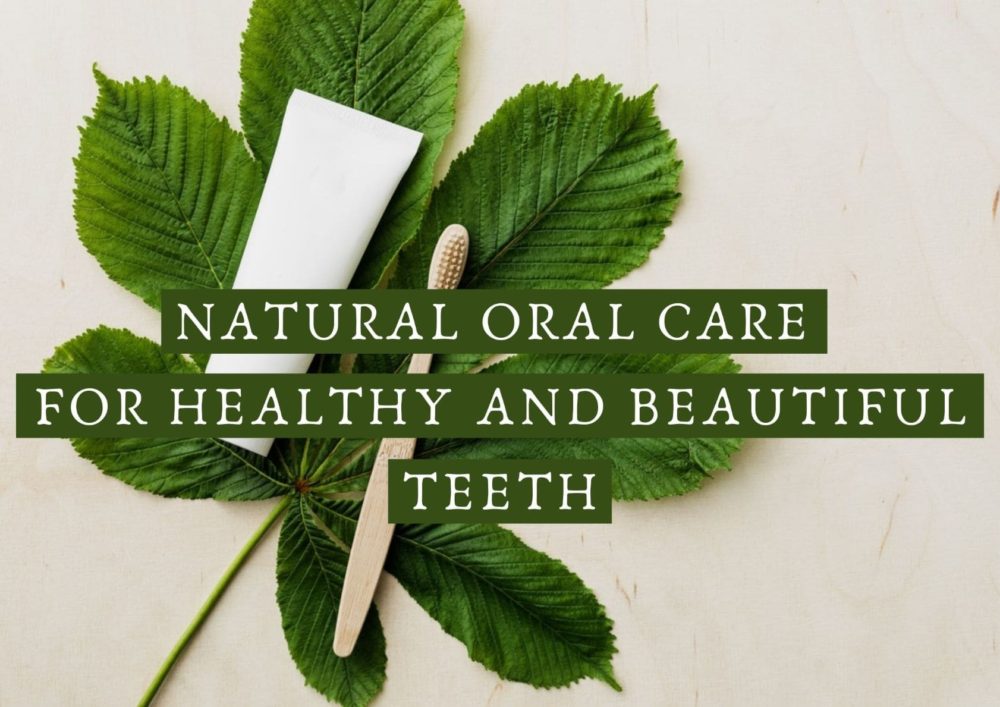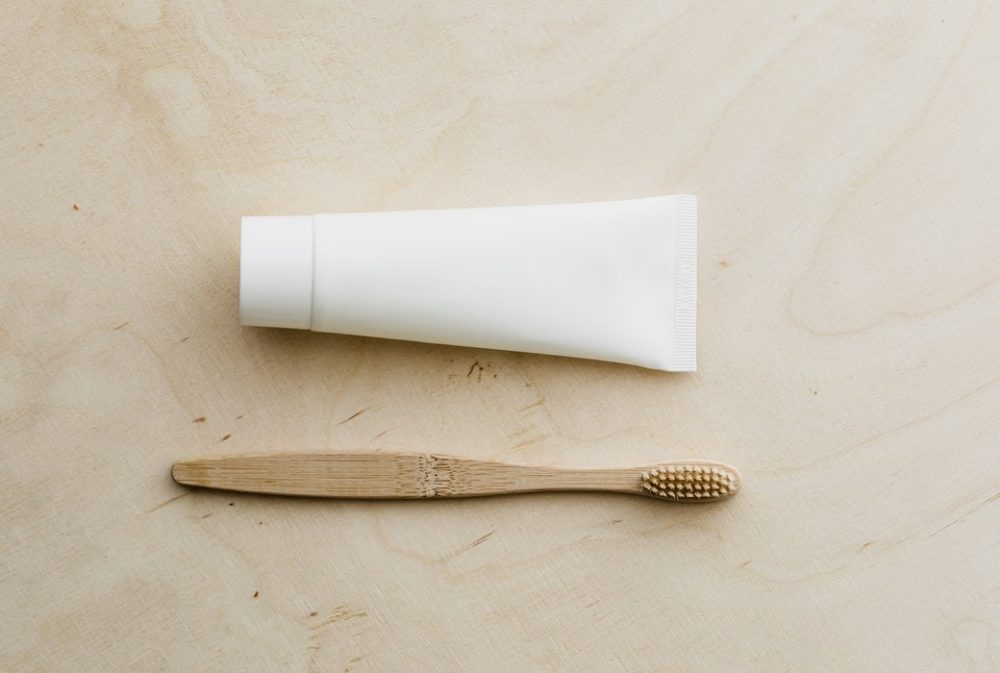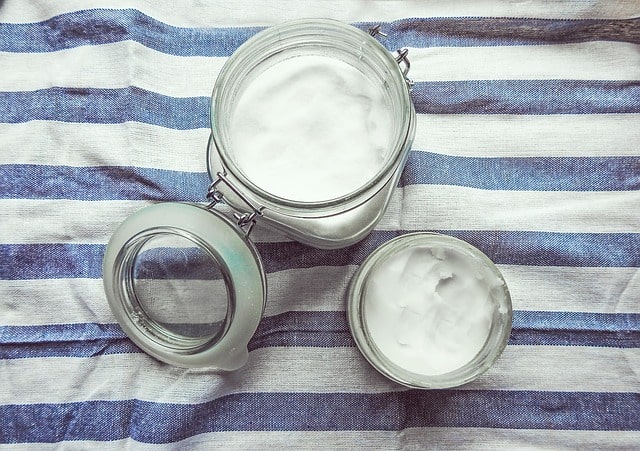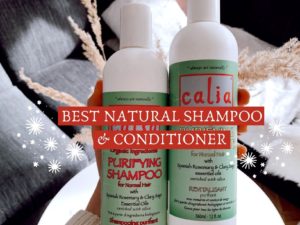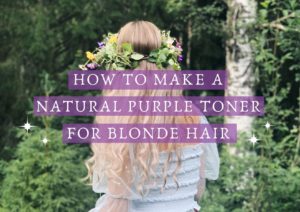This article is about natural oral care for healthy and beautiful teeth.
This article contains affiliate links.
We all want beautiful and sparkly white teeth. Apart from a pretty smile, having a healthy mouth is really important for our overall health as it is the starting point of the digestive system. That’s why it is important to have a good natural oral care routine that keeps your mouth healthy and beautiful!
Many of us are aware of what we eat and what we put on our skin. We want it to be organic and natural. But have you ever thought about what dental supplies you use?
A majority of the conventional toothpastes and mouthwashes sold at a chain store contain ingredients that can be harmful for both our bodies and the environment.
That’s why I recently made the switch to a natural oral care routine. I now use my simple homemade yet effective toothpaste and minty-fresh mouthwash to keep my teeth clean and breath fresh. Making your own dental care products does not only keep your mouth healthy, but it is also cheaper, saves the sea from plastic tubes and bottles and keeps your teeth looking great!
It is possible to get a shiny bright smile without harsh chemicals and expensive treatments.
Let me tell you how!
Why not Regular Toothpaste?
Before I made the switch, I was a bit worried. Is a homemade toothpaste really effective? Maybe the ”stuff” in regular toothpaste is what keeps my teeth healthy, so will a natural four ingredient toothpaste be enough?
To find out, I took a look into the ingredient list of a regular toothpaste from the supermarket and researched every ingredient to discover their actual function. And I was shocked by what I found out!!
These are the ingredients in the toothpaste and their function:
- Sorbitol: Sweetener & keeps the toothpaste together (does not make your teeth healthier).
- Aqua: Water. Prevents the toothpaste from drying out (does not make your teeth healthier).
- Hydrated Silica: An abrasive to keep your teeth clean and eliminate plaque.
- Glycerin: For a pleasant texture (does not make your teeth healthier).
- Peg-12: A silicone to give the toothpaste a good feel inside the mouth (does not make your teeth healthier).
- SLS: Detergent agent. Makes toothpastes foam (does not make your teeth healthier).
- Aroma: Minty taste (does not make your teeth healthier).
- Xanthan gum: A thickening agent (does not make your teeth healthier).
- Tetrasodium Pyrophosphate: Prevents formation of crystals that can become tartar. Because it has a bitter taste, more sweetener is needed and more detergent agent is needed to make it soluble (source).
- Cocamidopropyl betaine: A detergent. Makes toothpaste foam (does not make your teeth healthier).
- Sodium fluoride: Said to keep enamel strong, however opinions differ on this.
- Sodium Saccarin: Sweetener (does not make your teeth healthier).
- Hydroxypropul methulcellulose: Thickener, stabilizer and emulsifier (does not make your teeth healthier).
- CL numbers: Coloring agents (does not make your teeth healthier).
As you can see, there are ONLY THREE ingredients in the toothpaste for clean and healthy teeth. The rest of it is for flavoring, consistency and the feel of the toothpaste, which does nothing for the health of your teeth… Why even make a toothpaste out of these ingredients? The flavoring is understandable, but why make a toothpaste feel slick, foamy and sparkly blue when in fact it does nothing for the teeth? The answer is: because it sells better.
The manufacturers want us to feel like the product is effective, so we will buy it. Toothpaste should be attractive to the eye, taste sweet and minty, feel soft and slick in our mouth and burn and foam to give us that clean feeling. Because it creates the illusion of a clean mouth, this is what many of us prefer (and why my partner also refuses to switch to my natural toothpaste :'( ). And because we prefer this, it sells!
We think that the more toothpaste foams and burns, the more effective it is. Which is not true.
We have also been conditioned to think that we need this gooey white paste to keep healthy teeth. But it is yet another product we have to buy. I don’t mean that toothpaste is completely unnecessary, but I think it is healthy to have a skeptical view on products manufactured by big cooperations and sold at chain stores! Because often, their focus is more on profit than on anything else.
✧ Read: Why Organic & Natural Makeup is Better for You & the Earth
→ Regular Toothpastes Contain Harmful Chemicals
Even if there are a few ingredients in toothpaste that are effective in keeping your teeth healthy in some way, they are not necessarily good for the rest of your body. As for the ingredients that do nothing for dental health and only are in it for marketing purposes, they can have negative side effects that are totally unnecessary to burden your body with.
These are some of those ingredients and the negative impact they can have on your health.
- Sodium fluoride: Officially claimed to be a neurotoxin that can accumulate in the body and cause dental fluorosis (white specks on teeth) and other health problems. Also fluoride is toxic for the environment. Even though fluoride can strengthen the enamel, there are many negative side effects to it which makes you think twice before you use it. There are healthier options out there to strengthen tooth enamel.
- Triclosan: Harmful to human health and the reproductive system. Triclosan kills both bad and good bacteria in the mouth. It is banned from soap by the FDA but still found in many other personal hygiene products, such as toothpaste.
- FD&C: Has no purpose except adding color to the toothpaste. Some colorants have shown to cause serious negative health effects, such as hypersensitivity in children and cancer.
- SLS (sodium lauryl sulfate): SLS does not make your teeth cleaner, even if it may feel that way. SLS can irritate the mouth and gums, increasing the risk of canker sores.
- Hydrated silica: Used as an abrasive to scrub the teeth clean. It is a harsh abrasive with a scale of 5-7 on the Mohs scale (enamel scores a 5). It can therefore be too abrasive and actually damage the enamel.
→ We absorb things through the mouth
Products may be absorbed by the mouth very quickly. That’s why drops of CBD oil are placed under the tongue and why you can chew nicotine chewing gum if you stopped smoking. This means that the ingredients in your toothpaste can also get absorbed through the mouth and directly get into the blood stream. As we now know, regular toothpastes contain chemicals that you should not swallow, but we still put the paste in our mouth (and keep it there for at least a minute or two) twice a day. For your family’s health and yours, it might be wise to avoid using toothpaste with harmful ingredients and go for a natural option instead.
→ It is bad for the environment
Toothpaste tubes are usually made from different types of material and therefore don’t get recycled. That is why making your own toothpaste in a small glass jar will safe the earth from plastic contamination from an unnecessary and harmful plastic tube! Some toothpastes also contain micro beads, which are small beads of plastic helping to scrub plaque away from the teeth, which are disastrous for the environment and marine life. A few countries have already banned micro beads, but check the ingredient list to be sure your toothpaste does not contain this.
Some of the ingredients used in regular toothpaste are also bad for the environment, such FD&C’s and fluoride. Once you spit it out, it goes down the plughole and eventually ends up in the environment, where it can decrease plant growth, kill marine animals and cause sickness in wildlife. Using a 100% natural toothpaste in a sustainable container will be much kinder to the environment in both manufacturing and disposal of the product.
✧ Read: 27 Ways to Reduce your Plastic Waste.
The Effectiveness of Natural Oral Care
Toothpaste is not the most important thing for strong and healthy teeth. Some studies even claim that it makes no difference brushing with or without toothpaste. The most important thing is to prevent plaque from forming and let it sit on the tooth enamel, which leads to tooth decay. This is done by brushing and flossing frequently and effectively.
And for making your own toothpaste: as long as we find a natural alternative to the ingredients that have a function in normal toothpaste, it will work just as well. I would even say better if you add more ingredients that are actually beneficial to your oral health (and have no negative side effects on your health or the environment).
The three ingredients that had a function in the regular toothpaste was an abrasive for plaque elimination, an ingredient for tartar control and an ingredient for strong enamel. The abrasive can easily be replaced with baking soda, calcium carbonate or a clay powder. Tartar can be prevented by regularly brushing and flossing efficiently. As for a strong tooth enamel, we need to provide our bodies with enough minerals such as calcium, phosphate and fat soluble vitamins like D and K2.
You may have heard that baking soda is too abrasive on the teeth. While I did the research on that, I actually discovered that baking soda is less abrasive than hydrated silica, which is the abrasive used in normal toothpaste! Even if clay and baking soda feel more gritty, which is because the particles are larger than in regular toothpaste, the hardness scale of baking soda is much lower, which makes it less abrasive on the teeth.
If you worry about an ingredient being too abrasive, here is a list with common toothpastes and ingredients and their abrasiveness scale! It can be enlightening to see that most normal toothpastes are actually more abrasive than baking soda and clay powders.
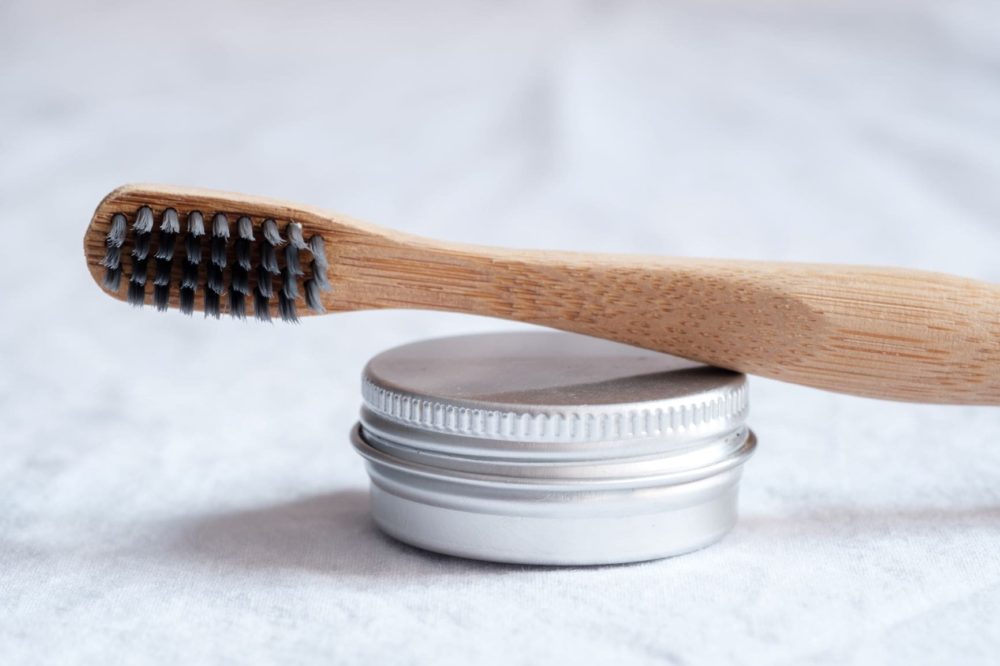
7 Tips to Create a Natural Oral Care Routine
1. Natural toothpaste
The first step towards a natural oral care routine is switching out the toothpaste. I think a toothpaste should only contain ingredients that really benefit the health of your mouth. And not include ingredients that have no use or potential downsides to them. Therefor, I create my own toothpaste using the following ingredients!
- Baking soda: Gently abrasive and helps to eliminate plaque from the teeth. Because baking soda is alkaline it reduces acidity in the mouth, bad breath and removes stains from teeth. Baking soda scores a 2.5 on the mohs hardness scale, which means it is soft and will not damage the enamel.
- Bentonite clay: Gently cleans and helps to eliminate plaque. Even if it feels grainy, it scores a 1.5-2 on the mohs hardness scale and will therefor not harm the enamel. Bentonite clay is also rich in minerals, such as calcium, magnesium and iron and can help in remineralising the enamel. Furthermore bentonite clay binds toxins and bacteria and alkalizes the saliva, which reduces acidity in the mouth.
- Coconut oil: Coconut oil is anti-bacterial, anti-viral, anti-fungal and can help prevent candida in the mouth. Use it in the toothpaste to bind all the dry ingredients together, or leave it out if you want a travel friendly tooth powder. Coconut oil also absorbs toxins and bacteria from the mouth.
- Peppermint essential oil: For a minty fresh taste and breath. Peppermint essential oil is antibacterial, reduces plaque, fights bad bacteria and can help in preventing cavities and gingivitis! It is also also anti inflammatory. Don’t use too much of it, a little goes a long way!
Natural Toothpaste Recipe
- 1 tbsp baking soda.
- 1 tbsp bentonite clay.
- 2 tbsp coconut oil.
- 1-2 drops peppermint oil.
- Combine all the ingredient together with a wooden spoon (to keep the bentonite clay activated).
- Store in a small glass jar with an airtight lid. Done!
Once you are done brushing, spit it out in the trash! Never in the sink or the toilet, as the coconut oil can clog the pipes. You can also leave the coconut oil out if you prefer a tooth powder, which is a really travel friendly option as well. Simply dip the head of your toothbrush in the powder and start brushing!
If you don’t want to make you own toothpaste but still want a more natural option, here are some good suggestions. However, be sure to check the ingredient list before buying a ”natural toothpaste”, because even toothpastes claiming to be natural can have the same harmful chemicals and harsh abrasives as the regular ones!
2. Natural mouthwash
Another great tip for creating a natural oral care routine is to switch to a natural mouthwash. The alcohol in regular mouthwash is really harsh and dehydrating, which can make the soft skin on the inside of your mouth more susceptible to bacteria and harmful chemicals. Not to talk about all the other unnatural ingredients found in common mouthwash!
You can easily make your own natural mouthwash by combing purified water, a few drops of peppermint essential oil, sea salt and aloe vera. It will give you a super fresh minty breath and leave your mouth feeling sparkly clean! If you do not have all the ingredients don’t worry, only water and peppermint oil works just fine too!
I make a small batch each time to make sure everything keeps fresh. If you have more people in the family using the mouthwash, simply double the recipe. Always spit the mouthwash out after use.
Natural mouthwash recipe
- 50-100 ml of water
- a pinch of sea salt
- 1 drop peppermint essential oil
- 1 tsp aloe vera gel
- Combine all the ingredients in a small glass jar or bottle.
- Shake well before use!
3. Brushing
Brushing regularly is the most important natural oral care routine to keep your teeth healthy! A good toothbrush is important to effectively scrub your teeth from plaque and bacteria.
Electrical toothbrushes are more effective at removing plaque than manual ones, so invest in a good quality electrical toothbrush you can use for years! If you use the homemade toothpaste with coconut oil, be sure to rinse the head of your electrical toothbrush with hot water after every use to avoid bad odor. I recommend using tooth powder with an electrical toothbrush to avoid the problem entirely.
If you use a manual toothbrush, be sure to avoid the classical plastic ones as they are not recyclable and therefor end up in landfill or the ocean. I use a manual toothbrush made from bamboo when I travel. The handle is made from bamboo and the bristles from nylon, which is a type of plastic that is recyclable (by pulling out the nylon bristles, put it into another plastic item so it doesn’t get lost…). But the best option, to save yourself from the job of recycling the bristles, is to get a 100% biodegradable toothbrush made from bamboo and boar bristles.
- Bamboo & boar bristle toothbrush: 100% biodegradable. Bristles made from boar bristles and handle from bamboo.
- Bamboo toothbrush: Bristles made from nylon and handle made from bamboo.
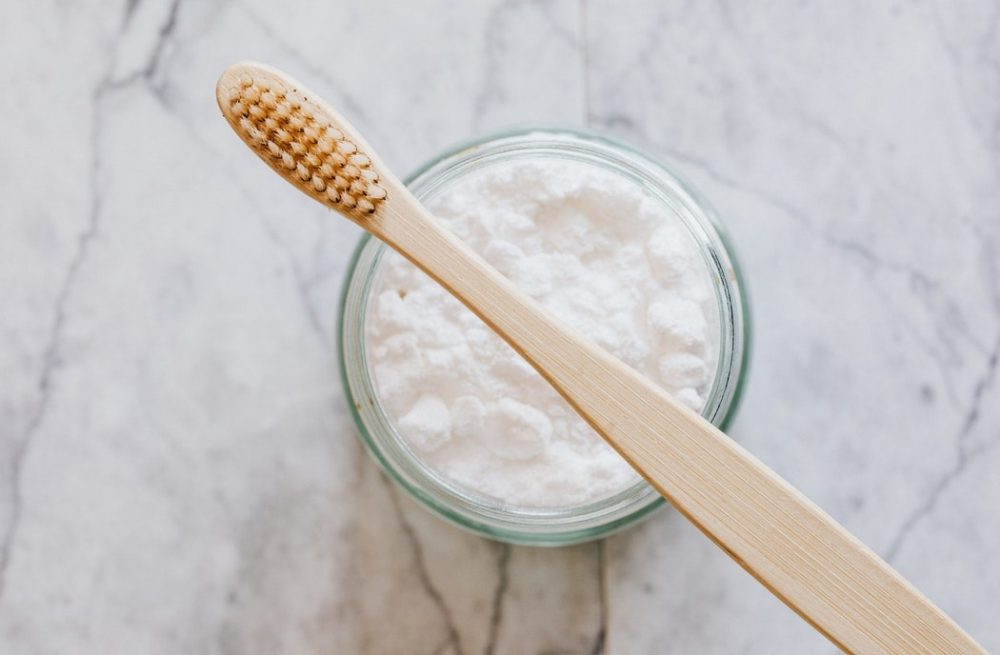
4. Flossing
Flossing is the second most important routine for healthy and great looking teeth! It is essential to remove plaque between the teeth where the brush can’t reach. When you floss, be sure to ”hug” the teeth and not just move the floss up and down between the teeth.
Dental floss is really bad for the environment because it is made from plastic. It isn’t recyclable and ends up in landfill or in nature where wildlife can choke or get tangled up in it. It also doesn’t come in earth friendly packaging (plastic…). Not only is regular dental floss plastic, it is also coated in chemicals called PFASs that make the floss glide better between your teeth. PFAS are water and grease proof chemicals, which if they end up in your body, can cause health problems such as cancer, thyroid disease and fertility problems.
Because ”regular” dental floss is not an option for me, I use a 100% biodegradable dental floss made from silk thread! It comes in a paper package and is stored in a small stainless steel container. You can buy re-fills for it too! It is a completely zero waste dental floss that also isn’t coated in toxic chemicals, but in completely natural candelilla wax. A perfect floss alternative for a natural oral care routine.
5. Tongue scraping
This is my favorite natural oral care routine! Tongue scraping is an ancient Ayurvedic practice to clean the tongue by scraping away the coating on the tongue. By removing this layer you remove toxins, bacteria, left over food and dead skin cells, that otherwise could cause an increase of bacteria in the mouth and bad breath. Except for a healthy mouth, tongue scraping also improves taste!
Bad bacteria is coating the tongue after a night of sleep, which can cause a bad breath. Scrape away the layer to freshen the breath and rid your mouth of bacteria. Start at the back of your tongue en gently pull the scraper forward. Rinse the scraper and repeat until your tongue is clean.
6. Oil pulling
Oil pulling is another ancient Ayurvedic ritual for cleansing the mouth and improving your overall health! The practice consists of swishing oil in your mouth for 15-20 minutes to detox your mouth and lymphatic system from toxins. Oil pulling is usually done in the morning, before brushing your teeth or eating, to wash away the bacteria that built up during the night. When you swish the oil around, the oil pulls out toxins and bacteria from under the gums, pores and from the teeth and leaves the mouth detoxified and fresh. You can use any type of oil, but personally I use one teaspoon of coconut oil with one drop of oregano essential oil. Coconut oil has antibacterial properties and so has the oregano oil, which also leaves behind a super fresh breath.
Do not spit out the oil in the sink as it can clog pipes (always spit out in the trash), don’t gurgle and certainly do not swallow.
7. Healthy diet
Eating a nutrient rich diet and avoiding sugar can make your teeth stronger and healthier! Vitamins and minerals important for strong teeth are calcium, phosphate, vitamin D & K2. Eat foods that are rich in these vitamins and minerals to help rebuild tooth enamel. Some examples are yogurt, cheese, eggs, fruits, vegetables, leafy greens, nuts and berries!
Bacteria thrives on sugar in the mouth and leaves the mouth acidic, which damages tooth enamel. Therefor you should avoid eating too much sugary food and especially hard and sticky candies that stay in the mouth for a longer time, like caramels or lollipops. You should also be aware of highly acidic beverages like soda, kombucha or lemon water! The acidity can wear on the enamel, making it softer and more susceptible to damage. Be sure to rinse your mouth after drinking acidic beverages and wait up to an hour before brushing. Also, don’t smoke if you want strong and healthy teeth.
✧ Read: How To Make Kombucha
So there you have it! I have been using this natural oral care routine myself for a while now, and I still have as healthy teeth as before (never had a cavity in my whole life!). Also, I am not the only one using a all natural toothpaste with success! And a tip: If you don’t want to switch a natural oral care in one day, you can slowly transition by using a natural toothpaste every other day instead.
If you are interested in more natural DIY beauty products, check out some of these posts:
- How to make a Natural Purple Toner for Blonde Hair
- How to make Bird Cherry Floral Water
- How to Make Natural Lip Balm
A Note From Bo!
I’m not a dentist and I can’t tell you what is best for your teeth. This article should not be taken as personal medical advice. Please do your own research and be sure to meet with a holistic dentist or other healthcare provider you trust with any questions you have regarding a medical condition or treatment.
Sources:
- Tetrasodium pyrophosphate for tartar control.
- Sodium fluoride, neurobehavioral effects of developmental toxicity.
- Triclosan health effects
- Food dyes and their health risks
- The effectiveness of SLS in toothpaste
- Hydrated silica abrasiveness
- Fluoride and the environment
- No difference in brushing with or without toothpaste
- Toothpaste abrasiveness list
- Baking Soda as an abrasive in toothpaste
- Bentonite clay mineral content
- Abrasiveness of bentonite clay
- Health problems PFA’s in dental floss
- Others using a homemade toothpaste: HelloGlow, PlasticFreeMermaid
Related Posts
SUBSCRIBE TO EARTHY VIBES
Then you’ll like Earthy Vibes newsletters!
Read our Privacy Policy.

